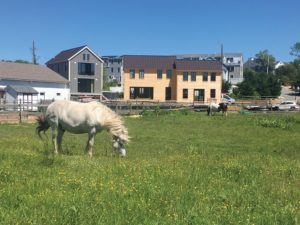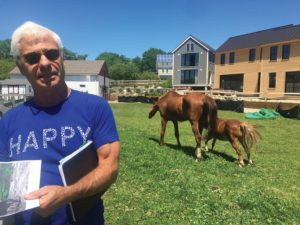PROVINCETOWN — David Krohn describes himself as a steward and protector of Bayberry Hollow Farm, five acres of mostly unbuildable wetlands on West Vine Street that is home to six horses. This is Provincetown’s last horse farm.

“We love this place,” said Krohn, a local real estate agent who bought the place in 2015. “It has drawn beautiful people, and it has a life of its own.”
But the Provincetown Conservation Commission has a different view of Krohn. On June 7, the commission fined him $8,400 for building a retaining wall 13 feet closer to the wetland than where they had approved the work, for adding fill to a parking area, and for adding a wall that was not part of the plan the commission had reviewed and permitted in December 2019.
This was not Krohn’s first run-in with the commission.
Soon after buying the property, he began making plans to develop the sliver of buildable uplands on it. He got permission to construct two buildings containing a total of four condominium units. They are partially constructed. He also received permission to build a single-family home, as yet unbuilt.
Before approving his plan in 2019, the commission discussed the fact that Krohn had brought in 60 cubic yards of loam to spread over a 9,000-square-foot area. He did that without seeking permission, Conservation Agent Tim Famulare said during the 2019 hearing.
“You kind of just keep doing things over and over again,” Commissioner Joseph Cooper told Krohn on June 7, when the fines were imposed.
When he first came before the commission, Krohn asked to construct a barn that could host events such as weddings, Commissioner Oriana Conklin told the Independent. He argued that he qualified for an agricultural exemption, a designation that could allow him added parking, Conklin said.

He continued to make that argument even after he ditched the plan to build the barn. Famulare told the Independent he has repeatedly told Krohn he does not qualify for the exemption because his activities of boarding horses and maintaining a small vegetable garden do not meet the definition of a farm.
“The main issue is he comes before us and presents one project and then does something completely different,” Conklin said.
The conservation commission regulates work done near wetlands. Bayberry Hollow Farm is mostly a wet meadow prone to flooding, surrounded by tall condominiums. Some residents of the abutting housing units have complained about Krohn’s project.
But Krohn said he has worked hard to preserve the farm, which had been owned and operated previously by Martha Roderick since the 1970s.
As evidence, Krohn said he has replaced all the fencing and mowed down 300 miles — in 24-inch rows — of purple loosestrife, an invasive weed that was choking native plants. With his barn manager, Robin Evans, who has managed the farm for 30 years, he shovels 40 pounds of manure per horse daily, he said.
Krohn apologized to the commission on June 7 for his missteps and agreed to take down the walls as instructed and remove the fill.
“I have learned a very big lesson,” Krohn said at the meeting. “I feel I owe you a huge apology,” he added, promising to call Famulare every week if needed to tell him what is going on.
“The big lesson,” Krohn concluded, “is to call Tim.”



